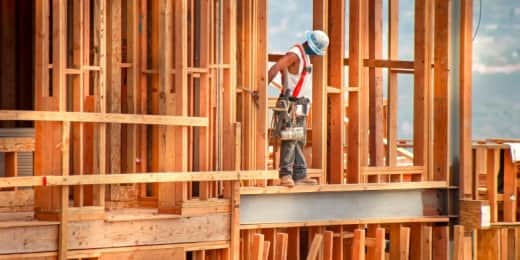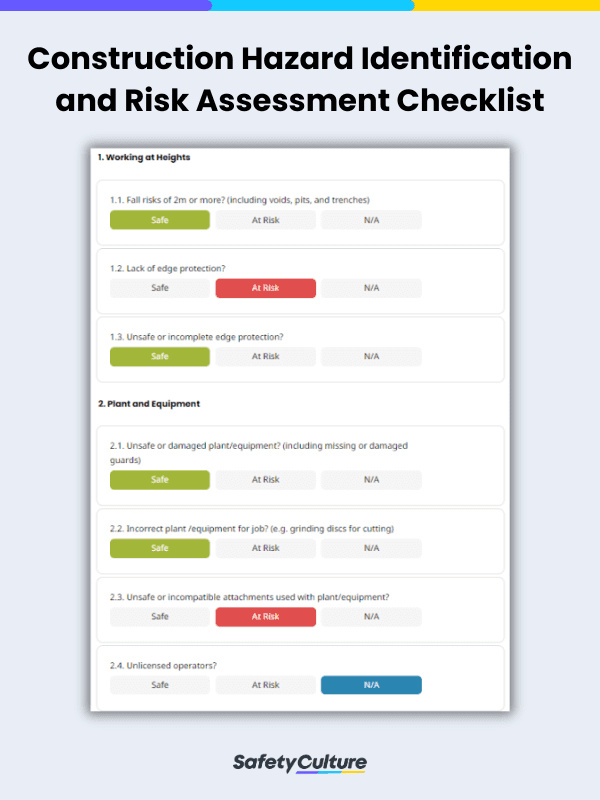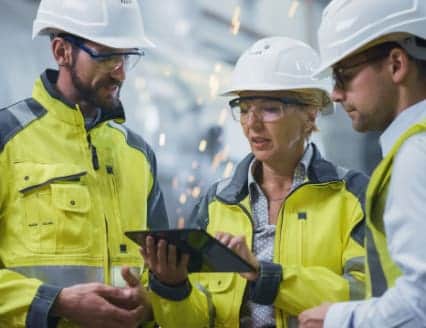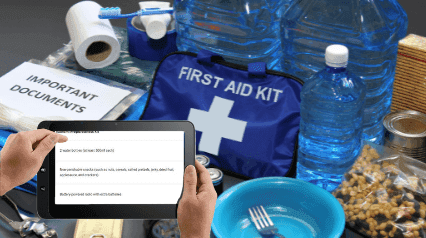Construction Hazard Identification: The Basics
Learn how to identify and assess potential construction hazards that can cause injuries or fatalities on construction sites.

Published 26 Jun 2024
Article by
3 min read
What is Construction Hazard Identification?
Construction hazard identification is the process of recognizing and evaluating potential hazards that can occur during construction activities. It involves identifying the types of hazards, assessing their risks, and implementing measures to mitigate or eliminate them.
Types of Construction Hazards
Construction hazards typically involve three categories, while other types of hazards may also be known depending on the nature of the project. Here’s a quick guide to the most common hazards present in construction work:
Physical Hazards
Physical hazards are the most common type of hazard in construction. A good way to determine the physical hazards you might have on your site is by conducting pre-start checks and safety audits to evaluate all potential hazards before undertaking certain kinds of work.
Examples of Physical Hazards in Construction:
Machinery and equipment
Vibration
Chemical Hazards
Chemical hazards typically include exposure to hazardous substances like solvents, paints, adhesives, and other common chemicals that are used in construction. These hazards can cause acute or chronic effects acquired through inhalation, ingestion, absorption, or injection (skin punctures).
Examples of Chemical Hazards in Construction:
Lead
Silica
Welding fumes
Solvents
Ergonomic Hazards
These include hazards related to repetitive motions, heavy lifting, or other physical demands that can cause musculoskeletal disorders (MSDs). Ergonomic hazards are usually self-inflicted through working with unhealthy conditions such as wrong postures, but can also be inflicted by the usage of tools, equipment, and environment.
Examples of Ergonomic Hazards in Construction:
Poorly designed tools
Vibration exposure
Heavy lifting
Awkward postures
Inadequate training
Improve your EHS Management
Cultivate a safe working environment and streamline compliance with our EHS solutions.
How to Identify Construction Hazards in Two Ways
After exploring the types of hazards present in construction processes, it’s vital to know how to identify them. Here are two ways to do this, as follows:
Regular Site Inspections
Conduct a thorough site inspection by walking through the entire construction site to identify any hazards that may be present or develop over time. Look for obvious signs such as uneven surfaces, sharp edges, exposed wires, or missing guards. There are many ways to conduct site inspections, but it’s important to use a comprehensive checklist to ensure you don’t miss anything.

Construction Hazard Identification and Risk Assessment Checklist | SafetyCulture
Job Safety/Hazard Analysis (JSA/JHA)
Provide guidance on recognizing common hazards in the construction industry and evaluating their severity and likelihood. Create bite-sized training courses to enhance workers’ skills in identifying hazards, assessing risks, and determining appropriate control measures during the JSA/JHA process. Track training completion and engagement to pinpoint areas for improvement.
Easily Identify Construction Hazards with a Digital Solution
Why use SafetyCulture?
SafetyCulture is a mobile-first operations platform adopted across industries such as manufacturing, mining, construction, retail, and hospitality. It’s designed to equip leaders and working teams with the knowledge and tools to do their best work—to the safest and highest standard. Efficiently manage and streamline health and safety processes across the organization, including incident management, safety audits and inspections, risk assessment, waste management, and more, using a comprehensive EHS software solution.
✓ Save time and reduce costs ✓ Stay on top of risks and incidents ✓ Boost productivity and efficiency ✓ Enhance communication and collaboration ✓ Discover improvement opportunities ✓ Make data-driven business decisions
Related articles
Environmental Safety
Safety

A Comprehensive Guide to Stormwater Pollution Prevention Best Management Practices (SWPPP BMP)
Learn about the types of best management practices for SWPP and the steps to effectively implement them in prevention plans.
Risk Assessment
Safety

The Ultimate Guide to Emergency Preparedness and Response
Learn how you can develop an effective emergency plan and stay one step ahead of natural disasters or other catastrophes.
Safety
Safety Management

Disaster Preparedness Plan
Learn more about the disaster preparedness plan, its importance, features, and example. Find out how a digital tool can help prepare against disasters.